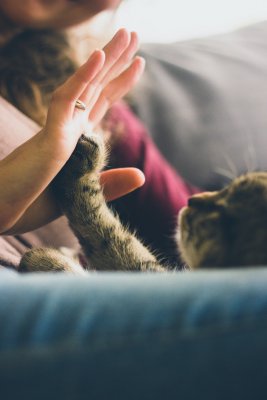Grief and the Loss of a Pet – Why Does it Hurt so Much?

photo by Javier Amador
by Andrea M. Darcy
Recently experienced the loss of a pet to old age, illness, or an accident? And feeling devastated?
Why does the loss of a pet feel so much worse than I expected?
The idea that an animal we bring into our lives is ‘just a pet’ is a gross underestimate of their real value. The uncomplicated love that pets give and receive can be the very reason their loss is so complicated.
1. It is often our first real experience of loss.
Pets have a shorter lifespan than humans. So they can be the first time we have had to witness a being we truly love or who is part of our immediate family die. Or the first time we go through the bereavement process.
2. Euthanising our pet complicates our grief.
Unfortunately, many of us have to make the choice to euthanise our pet when they are very ill, or so old their quality of life is diminished. This is rarely a choice we have to make with our human relationships, barring exceptional circumstances. It can present quite a dilemma, not just psychologically, but also ethically.
We can feel guilty that they died because of our choice, no matter how sick they were. Or that we couldn’t afford the bills that might have afforded them a bit more life. And even more guilty that we are relieved to not have to care for a very sick animal anymore. The guilt just exacerbates our grief.
3. We have lost our closest companion.
Animals give new meaning to the term ‘unconditional love’. They don’t need us to look pretty, be showered, make sense, or be in a good mood. They just show us affection regardless, without expectation. This often means we can actually have a freer, easier bond with a pet than anyone around us.
For some of us, a pet even represents the only living being we are actually ourselves around, or actually trust.
In psychology, ‘attachment theory’ is about how we bond with others, based on what we learned from our main caregiver growing up.
Research from the University of Arizona looking at how attachment affects our grief predictably found that the closer we are to another, the more we feel loss. And if we tend to be anxious when we attempt love and trust, called ‘anxious attachment‘, then the grief can be even greater.
4. Our pet was psychologically our child.

photo by Jonas Vincent
In their book Pet Loss: A Thoughtful Guide for Adults and Children, psychotherapists Nieberg and Fisher point out that a pet can become stand-in for the child we never had. Their loss can therefore feel as intense as the loss of a child.
5. They were our defence against loneliness.
We don’t set out to use our pet to avoid loneliness. But it can happen. When we lose them, the loneliness comes back, adding to our sadness and feeling of loss.
6. We are finally processing long held grief about other things.
Our uncomplicated sadness over losing a pet can trigger unresolved grief around more complicated bereavements we experienced previously.
In his research paper “The Death of a Pet: Implications for Loss and Bereavement Across the Lifespan“, psychologist Shane Shackford discusses a case study of a family. They experienced the loss of a dog two years after the loss of the father of the family. As well as grieving the loss of their beloved pet, the family members found they were again grieving their family member.
7. We have lost our only companion who gave our life purpose.
For many elderly people, and also for those who suffer depression or social anxiety, a pet can become their only companion. And it can add purpose to your days. Even if you feel too low to really do anything, your pet needs you, so you get up and face the day, and get them fed and watered and walked. Without them, we can feel like our life purpose is no longer there.
Am I a bad person that I feel worse about losing a pet than a friend?
Again, a pet can be easier to love. We can form a closer attachment as there are less expectations to navigate. So it’s okay to feel worse.
How can I navigate grief around losing a pet?
The first step is of course to accept that it is grief at all, and to stop pretending you are fine if you really aren’t. It’s okay to feel hurt and upset. Then the following tips can be useful.
1. Learn about euthanasia.

photo by Matt Seymour
In the case of an accident or sudden sickness, we can find ourselves watching our pet being euthanised before we even have time to think or process what is happening. And then afterwards all we feel is guilt, or like we have done something terrible. A bit of research can go a long way here.
A report by the American Veterinary Medical Association shares that, “an owner’s emotional distress can be reduced simply by educating and assuring the owner that this technique used to induce death is relatively painless for the animal”.
2. Write out the good memories.
When we feel guilty and sad our thinking can get caught in negative loops. This can mean we go over and over what we could have done differently, and obsess on the difficult last moments of our pet’s life.
Break your brain’s addictive cycle by sitting down and writing out your positive memories from the life you shared with your pet. Talking about it also helps, but many people find the process of writing particularly powerful, as we don’t alter our own process to match someone else’s judgement.
3. Choose to be around others who understand.
Not everyone has had a pet or likes animals. Some people also come from cultures that simply don’t see animals in the same way as Western culture does.
Instead of being angry at people for their lack of experience, simply make better choices about who you choose to be around at this difficult time. And share your feelings with those you can trust to understand.
Don’t have someone to talk to? Cat’s Protection charity in the UK has a free and confidential helpline for those dealing with the grief of the pet where you can talk to a trained listener. Learn more here.
4. Create a ritual to celebrate your animal companion.
In his research paper “The Death of a Pet“, psychologist Shane Shackford also points to the evidence that the loss of effective mourning rituals in Western society has “led to insufficient grieving and inadequate resolution of grief”.
What sort of ritual might help you, personally, celebrate your pet’s memory? Is it something you do alone, or with friends and family who also cherished your pet? Is perhaps something you would like to do once, or continue yearly?
5. Admit you need support.
There are research papers and books written about grief around pets. In other words, you are not alone in this experience, it is a real and serious issue, and it is okay to feel sad and to take your sadness seriously.
If a few weeks have passed since your loss and your grief continues to affect your daily coping skills, or truth be told your grief is getting worse? It’s time to consider support. Almost all counsellors or psychotherapists will be able to help with this issue, or you might want to consider one who specialises in grief.
Need help navigating the loss of a pet? We connect you with warm, understanding, and highly experienced talk therapists in central London locations. Or use our booking site to find UK-wide talk therapists and online counselling.
Still have a question about the loss of a pet, or want to share your experience of navigating pet grief? Use the comment section below.
 Andrea M. Darcy is a self development expert and teacher as well as writer. She grew up with a constant stream of pets, sometimes as many as five. If she had to pick an animal who she is most alike it would probably be a Vizla. Find her on Instagram @am_darcy
Andrea M. Darcy is a self development expert and teacher as well as writer. She grew up with a constant stream of pets, sometimes as many as five. If she had to pick an animal who she is most alike it would probably be a Vizla. Find her on Instagram @am_darcy




